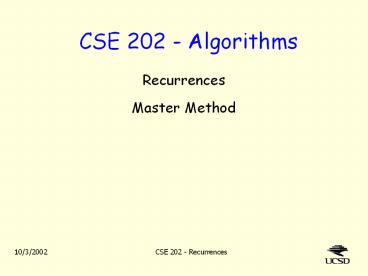CSE 202 - Algorithms - PowerPoint PPT Presentation
Title:
CSE 202 - Algorithms
Description:
All levels take about the same time. Happens when f(n) is (alogbn). If so, ... Master method can 'interpret n/b to mean either n/b or n/b ' CSE 202 - Recurrences ... – PowerPoint PPT presentation
Number of Views:80
Avg rating:3.0/5.0
Title: CSE 202 - Algorithms
1
CSE 202 - Algorithms
- Recurrences
- Master Method
2
Your turn ...
- For one of the following recursion trees ...
- T(n) 3T(n/4) 5n for n 256
- T(n) 2T(n/2) 5n for n 32
- T(n) 3T(n/2) 5n for n 32
- T(n) 3T(n/2) n2 for n 32
- T(n) 4T(n/2) n2 for n 32
- ...figure out the total combine time (the last
term) needed at each level. - Answer should be a sequence of 5 or 6 numbers.
3
Recursion Tree for T(n) aT(n/b) cn
c n
1 depth-0 node
a depth-1 nodes
c n/b
c n/b
c n/b
...
a2 depth-2 nodes
c n/b2
c n/b2
c n/b2
c n/b2
...
...
...
...
...
alogbn nodes at depth logb n
T(n) lt c ( 1 a(n/b) a2(n/b2) ...
alogbn(n/ blogbn) ) lt cn ( 1 a/b (a/b)2
... (a/b)logbn ).
4
How does your tree grow?
- Whats T(n) cn ( 1 a/b (a/b)2 ...
(a/b)logbn ) ? - The largest term of a geometric series
dominates. - If a/b lt 1, the first term dominates
- Thus, T(n) ? ?(n).
- If a/b gt 1, the last term dominates
- So T(n) ? ?(n(a/b)logbn ) ?(n(a logbn/blogbn) )
?(n(a logbn/n) ) ?(a logbn)
?(nlogba). - If a/b 1, all terms are equal. There are logbn
terms. So T(n) ? ?(n logbn ) ?(n lg n).
5
Where are we ??
- In Divide Conquer ... if T(n) aT(n/b) cn,
- (i.e. if you can combine pieces with linear work)
- then there are three cases
- if agtb, then T(n) is ?(nlogba) (there are so
many tiny subproblems, they dominate the time) - if ab, then T(n) is ?(n lg n) (just like merge
sort) - if altb, then T(n) is ?(n) (big step is most
expensive)
6
What if combining takes f(n) work??
- In Divide Conquer ... if T(n) aT(n/b) f(n),
then three corresponding cases are - The tiny subproblems dominate the run time
- Happens when f(n) lt c a f(n/b) for some clt1 and
all n - If so, T(n) ? ?(alogbn ) ?(nlogba ).
- All levels take about the same time
- Happens when f(n) is ?(alogbn).
- If so, T(n) ?(f(n) lg n).
- Big step is most expensive
- Happens when f(n) gt c a f(n/b) for some cgt1 and
all n. - If so, T(n) ?(f(n)).
7
Previous slide is Master Method
- Slight differences
- Books condition on case 1, f(n) is
O(nlogba-?), is slightly more general. - It allows f(n) to be less uniform.
- Case 2 remember alogbn nlogba.
- Book has (unnecessary) extra condition in case 3
- f(n) is ?(nlogba?) is implied by f(n) gt c a
f(n/b), cgt1 - Master method can interpret n/b to mean either
?n/b? or ?n/b?
8
Other recurrences
- Master Method doesnt always apply
- What if, in MergeSort, we divided 75 - 25 ?
- T(n) T(3n/4) T(n/4) c n.
- Or we divided into 1000 and n-1000 sized pieces?
- T(n) T(1000) T(n-1000) cn (for ngt1000).
- Or consider
- T(n) 2T(n/2) n lg n.































